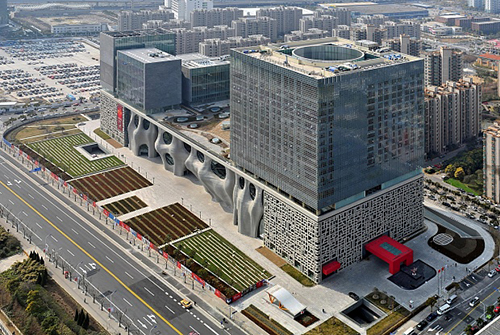Hans Ulrich Obrist and Yongwoo Lee have invited artists, architects, hackers, bloggers and activists to participate in inaugural Shanghai Project
Shanghai Himalayas Museum will be the main venue of the inaugural Shanghai Project. Image: courtesy of Shanghai Project
A new, large-scale cultural project based in Shanghai will weigh up the future of humanity, questioning the impact of climate change and urban sprawl. The Shanghai Project, a biennial event which launches later this year (5 September-13 November), will be overseen by Yongwoo Lee, the director of Shanghai Himalayas Museum, and Hans Ulrich Obrist, the co-director of Serpentine Galleries in London.
The inaugural edition, entitled 2116, projects 100 years into the future when—according to a report by the science research organisation Climate Central—76% of Shanghai’s population will be located in areas submerged underwater due to global warming.
Shanghai Project promises to be a multidisciplinary venture covering visual art; architecture, design and communication; performance, moving image and sound; humanities and social sciences; and science, technology and ecology. “Artists, filmmakers, performers, musicians, designers, architects, engineers, hackers, bloggers, activists, and the people of Shanghai,” are invited to take part.
Ten individuals from various disciplines, or “root researchers”, will build teams responsible for producing new publications and works due to be unveiled at the close of the project.
Lee, the founding director of the Gwangju Biennale, is convinced that the project will appeal to a wider audience. A spokesman for Shanghai Project says: “He understands many biennales as being theory-driven and only accessible to a niche audience of art professionals and academics. The proposed format, inviting ‘researchers’ and so on, will aim to introduce something quite different.”
Exhibitions, public art installations, and commissioned architectural structures will form part of the programme, with the Shanghai Himalayas Museum in Pudong the main venue. The museum was founded by the Zendai Group, a Shanghai-based property and tourism conglomerate, which is funding the initiative, along with the energy group Envision.
Works by younger Chinese artists selected for the ongoing 89plus research project founded by Obrist and the French-born curator Simon Castets will be included. According to the Financial Times, the event will also feature new commissions by the artists Adrián Villar Rojas and Anish Kapoor though a spokesman says this is unconfirmed.
